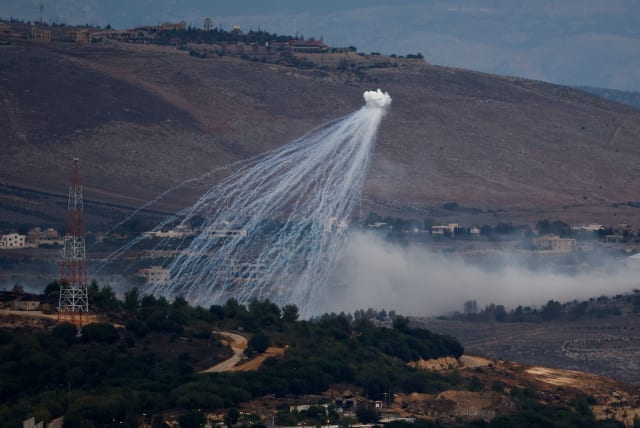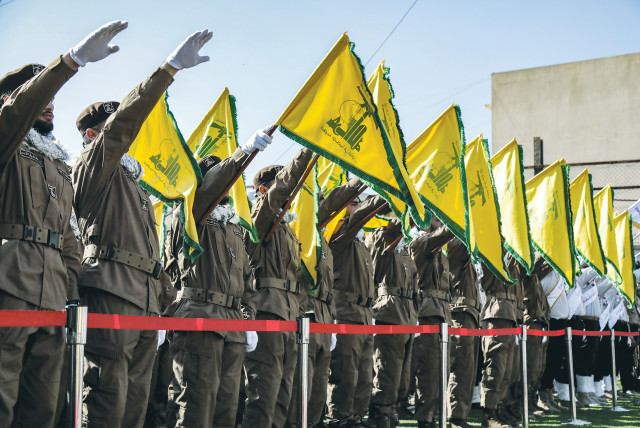Everything you need to know about the conflict between Israel and Lebanon - explainer

What is the Israel-Lebanon conflict? Where did it start? Who are the key players involved? Here is everything you need to know.
Israel has long experienced strife with its neighbors, and the country of Lebanon is no exception.
The two countries have fought multiple conflicts, and tensions have always remained high along the border. And in recent months, amid the ongoing Israel-Hamas War, experts fear a dangerous escalation between the two countries seems more likely.
But what is the Israel-Lebanon conflict? How did it start? Who are the key players involved?
Here is everything you need to know.
Where is Israel?
Israel is a country in the Middle East, specifically in the Levant region. It is steeped in thousands of years of history and has been the home of numerous civilizations and religious faiths.
Israel is bordered by Egypt, Jordan, Lebanon, Syria, and the Palestinian territories and is on the coast of both the Mediterranean Sea and the Red Sea.
While most countries consider Tel Aviv its capital, Israel and a few other countries, such as the United States, recognize Jerusalem as the capital. Its largest city in the North is Haifa.
Israel also has control over a region known as the Golan Heights, which borders Syria and Lebanon. Israel formally annexed the territory, and its sovereignty was recognized by the US, but other countries only see it as occupied territory.
Where is Lebanon?
Lebanon is an Arab country in the Middle East bordered only by Israel and Syria. Its coastline is along the Mediterranean Sea, and the island nation of Cyprus is relatively close by across the sea. Lebanon's capital city is Beirut.
Like Israel, Lebanon has a rich history going back thousands of years. It has been home to numerous religious faiths and nations throughout the ages. Most recently, it was a French colony before becoming independent in the 1940s.
How long is the Israel-Lebanon border?
The Israel-Lebanon border is an ongoing debate, and neither of the two countries involved has agreed upon it.
According to the United Nations Interim Force in Lebanon (UNIFIL), the de facto border, around 120 kilometers long, is known as the Blue Line. It is a demarcation line separating Israel and the Golan Heights from Lebanon. However, it is considered a mere withdrawal line, not a permanent border.
Currently, several locations along this line are the subject of a dispute over sovereignty between Israel and Lebanon, including the town of Ghajar, the Shebaa Farms, and the peak of Rosh Hanikra.
A dispute also existed over the Israeli-Lebanon maritime border, specifically over control of the Kana and Karish natural gas fields, but this dispute was settled in 2022.
Why are Israel and Lebanon enemies?
This is a complicated question with considerable history attached.
Israel and Lebanon have been enemies since 1948 when Lebanon took part in the Arab attack on the nascent Jewish state in the War of Independence. Since then, they have officially been enemy states.
Relations were worsened during the Lebanese Civil War and the first Israeli-Lebanon War (see below), and the two countries don't have ties to this day.
The issue has a lot of nuances and factors in hostile elements in Lebanon, such as Hezbollah (see below).
Why did Israel invade Lebanon in 1982?
Israel had been in conflict with the Palestine Liberation Organization (PLO) for years. The organization had taken root in southern Lebanon and had launched a series of attacks against Israel, with the IDF having launched counterattacks.
After an assassination attempt by Palestinian terrorists on Israeli ambassador Shlomo Argov, then-Israeli prime minister Menachem Begin ordered the invasion of Lebanon to wipe out the PLO.
It should be noted that many historians and records point to the Abu Nidal Organization, rather than the PLO, as being behind the assassination attempt at the behest of Iraq to spark a war in Lebanon. Still, ultimately, the stated goal of the invasion was to target the PLO and its Syrian allies.
To do this, Israel allied with Maronite Christian groups such as the Lebanese Front and the Phalangists and swept into Southern Lebanon and occupied it. The result was the PLO relocating out of Lebanon and the installation of a new regime under Bachir Gemayel.
However, Israel couldn't maintain its position in the area following Gemayel's assassination and the Sabra and Shalita massacre, where Israel's Phalangist allies massacred Palestinian civilians.
Why did Israel leave Lebanon?
As Israeli public opinion towards the war continued to sour and after a peace treaty became more and more unlikely to happen, the IDF had to withdraw to southern Lebanon, which they finished doing in 1985.
Occupying southern Lebanon allowed Israel to establish a security buffer, keeping mainland Israel safe from cross-border attacks by Palestinian terrorist groups.
However, Lebanese and Palestinian forces continued to wage a guerilla conflict against Israel and its allies over the next 15 years as the occupation continued to worsen relations with locals.
Eventually, Hezbollah became the dominant guerilla force in the region and was able to threaten the Galilee region with rocket fire and psychological warfare, which Israel struggled to combat against.
Eventually, in 2000, then-Israeli prime minister Ehud Barak withdrew from southern Lebanon unilaterally, fulfilling his campaign promise.
What is Hezbollah?
Hezbollah is a Shi'ite Islamist terrorist group and political party in Lebanon founded in 1985. It was initially established as a response to the 1982 Israeli invasion of Lebanon and quickly came under the backing of the Islamic Republic of Iran.
Hezbollah, led currently by Hassan Nasrallah, swiftly became the dominant armed group in Lebanon and was able to help push Israel out of southern Lebanon. Its fighters are well-trained and have also participated in conflicts in Bosnia and Herzegovina and Syria.
Over the years, Hezbollah has grown in power, being widely considered to be better equipped and trained than the Lebanese Army and arguably the strongest non-state actor anywhere in the world. It boasts tens of thousands of armed fighters, including the highly-trained Radwan Force commandos, and a wide range of rockets, missiles, drones, tanks, and other armored vehicles. Much of its military funding and training comes from its ally Iran.
Hezbollah has also achieved political power, winning control of large swathes of the Lebanese parliament during elections. It maintains its own affiliated news outlets, social services, radio and satellite TV stations, and more. It has gained so much power in Lebanon that many refer to Hezbollah as a state within a state.
However, Hezbollah is widely considered a terrorist organization around the world, though many, like the European Union, argue that only its military wing is a terrorist organization while its political faction is not. Exceptions to this trend include Russia, Iraq, China, North Korea, Syria, and Algeria.
In addition, Hezbollah has maintained that its primary goal is the destruction of Israel.
How many missiles does Hezbollah have aimed at Israel?
In late October 2023, publicly available sources gathered by the Institute for National Security Studies (INSS) at Tel Aviv University and the US-based Center for Strategic and International Studies (CSIS) noted that Hezbollah had around 150,000 missiles and rockets of various types. These include short-range rockets to guided missiles, anti-ship, anti-tank, and surface-to-air missiles. Some of these missiles, such as the Fateh-110, could reach well into Israel's South, with a range of around 300 kilometers. These missiles, unlike rockets, are also very accurate, boasting GPS navigation.
This is also without mentioning an unknown number of drones in Hezbollah's possession.
However, these exact figures are outdated as the war has raged on, and the current statistics are unknown.
Why did Hezbollah attack Israel in 2006?
On July 12, 2006, Hezbollah launched rockets at Israel in a diversionary tactic, carrying out a targeted anti-tank missile strike on IDF vehicles, killing eight soldiers and taking two others prisoner, Ehud Goldwasser and Eldad Regev.
Hezbollah proceeded to demand certain prisoners be freed in exchange for the Israeli soldiers. Still, Israel instead carried out a military assault, sending ground troops into southern Lebanon while striking targets from the air and sea.
Hezbollah's motivation appears to be to force Israel into a prisoner exchange, though they also claimed issue with Israel's continued control over the disputed Shebaa Farms.
What happened during the Hezbollah attack on Israel in August 2024?
Hezbollah claimed to have launched around 320 rockets at northern Israel in the early morning of August 25, 2024, in retaliation to an Israeli strike targeting thousands of rocket platforms in Lebanon.
The IDF's actions were taken in response to intelligence suggesting Hezbollah was preparing for a large-scale attack on Israel, including central areas and Tel Aviv.
The IDF reported successfully intercepting many of these attacks but did not provide specific numbers.
The conflict escalation coincided with Ziyara Shabaniya, a significant day for Shiites, raising concerns about potential symbolic actions by Hezbollah.
Why is Israel attacking in Lebanon?
The current conflict between Israel and Hezbollah was started just a day after Hamas attacked Israel, carrying out the October 7 Massacre.
That very next day, Hezbollah carried out attacks on the Shebaa Farms and declared support for Hamas's actions.
This was further exacerbated by Hamas and other armed Palestinian groups in Lebanon carrying out attacks on Israel, as well as Israel's tensions with Iran.
Following this, tensions have continued to escalate as both sides trade fire over the border, and many in Israel are raising calls to launch a more extensive campaign to eliminate Hezbollah to preserve Israel's security interests.
Hundreds have already been killed or wounded due to the conflict, and it remains to be seen how this will escalate going forward.
Jerusalem Post Store
`; document.getElementById("linkPremium").innerHTML = cont; var divWithLink = document.getElementById("premium-link"); if (divWithLink !== null && divWithLink !== 'undefined') { divWithLink.style.border = "solid 1px #cb0f3e"; divWithLink.style.textAlign = "center"; divWithLink.style.marginBottom = "15px"; divWithLink.style.marginTop = "15px"; divWithLink.style.width = "100%"; divWithLink.style.backgroundColor = "#122952"; divWithLink.style.color = "#ffffff"; divWithLink.style.lineHeight = "1.5"; } } (function (v, i) { });





